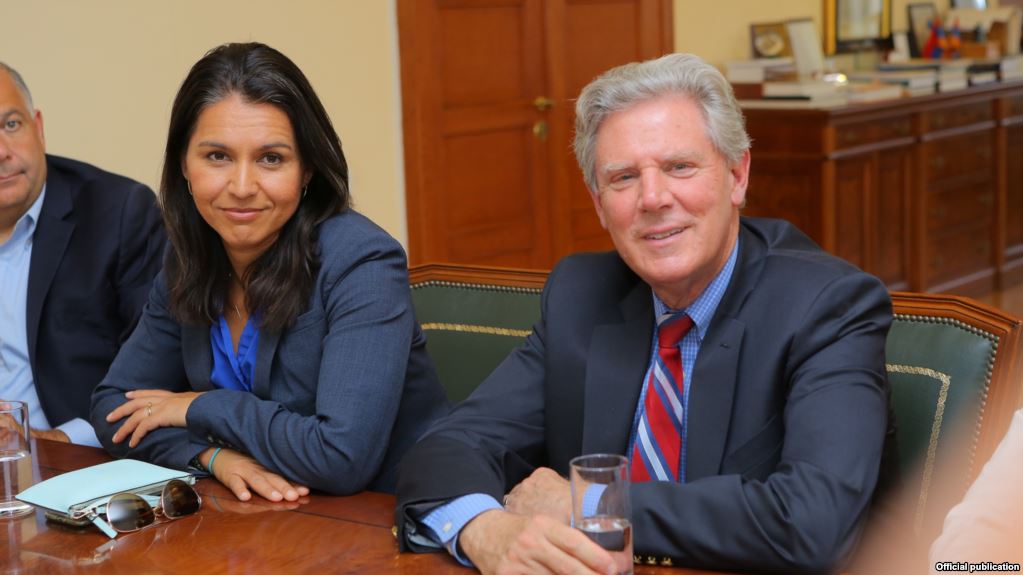
Congressman Frank Pallone (D-N.J.) has prepared a resolution intended to promote “free and open communication and travel between the United States and the Republic of Artsakh.”
The resolution notes that “current Department of State policies and practices place self-imposed restrictions on travel and communications between the United States and Artsakh, limiting oversight of United States taxpayer-funded assistance programs and discouraging the open dialogue and discourse that can contribute to a peaceful resolution of Artsakh-related status and security issues.”
It calls instead for “actions that encourage visits and communication between officials from the United States and Artsakh at all levels, including cabinet-level national security officials, general officers, and other executive branch officials, to travel to Artsakh and openly and directly communicate with their Artsakh counterparts.”
Pallone is the founding co-chair of the congressional Armenian Caucus and has visited Karabakh on several occasions, most recently last September, “to stress the importance of its status as an autonomous and fully functioning democratic state.”
The text of the resolution was published by Pallone’s office on January 17:
Expressing the sense of the House of Representatives supporting visits and communication between the United States and the Republic of Artsakh at all levels of civil society and government.
RESOLUTION
Expressing the sense of the House of Representatives supporting visits and communication between the United States and the Republic of Artsakh at all levels of civil society and government.
Whereas peace, stability, and democracy in the Caucasus region are in the political, security, and economic interests of the United States and are matters of international concern;
Whereas the United States considers any effort to determine the future of the Republic of Artsakh, formerly the Re- public of Nagorno-Karabakh, by other than peaceful means, including acts of aggression, blockades, or threats against civil aviation, a threat to peace;
Whereas the United States remains committed to the Organization for Security and Cooperation in Europe’s (OSCE Minsk Group negotiations toward a durable and democratic resolution of outstanding status and security issues related to the Artsakh Republic;
Whereas the Artsakh Republic was one of three parties to the 1994 cease-fire that ended major military hostilities be- tween Artsakh and Azerbaijan, and remains committed to a negotiated, non-violent resolution;
Whereas the Artsakh Republic took part in OSCE negotiations until 1998, when, at Azerbaijan’s insistence, the OSCE blocked its democratically-elected representatives from full and direct participation in negotiations regarding its future status and security;
Whereas the Artsakh Republic has developed democratic institutions, fostered a pluralist political system, and, over the past quarter century, held parliamentary and presidential elections that have been rated as free and fair by international observers;
Whereas the Artsakh Republic, along with United States, Armenia, and the OSCE, support cease-fire monitoring proposals to strengthen the 1994 cease-fire, including—
(1) an agreement from all sides to not deploy snipers, heavy arms, or new weaponry along the line of contact;
(2) the placement of OSCE-monitored, advanced gunfire-locator systems and sound-ranging equipment to determine the source of attacks along the line of contact;
and
(3) the deployment of additional OSCE observers along the line of contact to better monitor the cease-fire;
Whereas the United States since fiscal year 1998 has provided over $45 million to the victims of the Artsakh-Azerbaijan conflict, including projects to deliver maternal healthcare, provide clean drinking water, and clear mine- fields in Artsakh, with Secretary of State Rex Tillerson stating that the United States remains ‘‘focused on completing demining as quickly and as thoroughly as possible’’;
Whereas current Department of State policies and practices place self-imposed restrictions on travel and communications between the United States and Artsakh, limiting oversight of United States taxpayer-funded assistance programs and discouraging the open dialogue and discourse that can contribute to a peaceful resolution of Artsakh-related status and security issues, and;
Whereas open dialogue and communications contribute to greater international understanding and facilitate more effective conflict resolution: Now, therefore, be it
1 Resolved, That the House of Representatives—
(1) affirms its commitment to supporting actions that encourage visits and communication between officials from the United States and Artsakh at all levels, including cabinet-level national security officials, general officers, and other executive branch officials, to travel to Artsakh and openly and directly communicate with their Artsakh counterparts;
(2) encourages open communication, meetings, and other direct contacts between officials of Artsakh and the executive and legislative branches of the United States, representatives of State and local governments, and representatives of American civil society; and
(3) calls for the full and direct participation of the democratically-elected Government of the Republic of Artsakh in all OSCE and other negotiations regarding its future.









